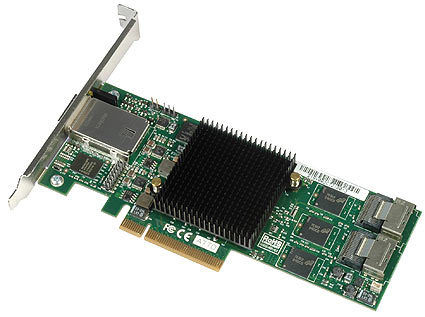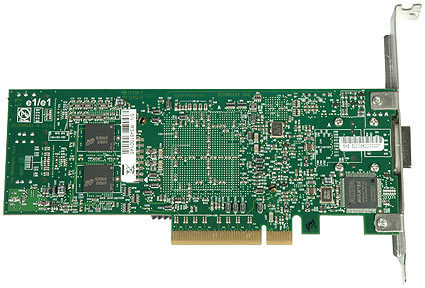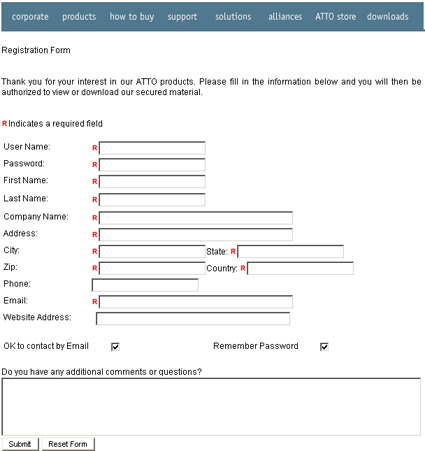Unified Serial RAID Controllers for PCIe
Atto Express SAS R348
Atto offers two PCI Express based RAID 5 SAS/SATA controllers: the R380, which has two high-density ports for up to eight devices, and the R348, which has one port for four external devices (SFF 8088) and two ports for up to eight internal devices (SFF 8087). However, you can only use a maximum amount of eight ports, whether internal or external. According to the Atto website, this feature is still unique; hence, we had a look at the R348, because we consider it more flexible than the R380.
Some drawbacks first: this controller does not support RAID, and it does not offer such extensive operating system support as the Adaptec. It also only has a two-year manufacturer warranty, whereas Adaptec, ICP and Ciprico/Raidcore come with a three-year warranty. We were also told that the controller’s default settings may not provide the best performance - unfortunately, this message arrived after we had finished testing. The feature called RGSSpeedRead will enable read look-ahead for RAID drives, but this setting has to be activated via a command line interface; we found a brief description of this feature on one of the last pages in the manual. We did not have the time to repeat all the tests, but read performance clearly improves once RGSSpeedRead is enabled. It’s a pity that Atto doesn’t enable it in the factory, or at least devote a small chapter on performance tuning in the manual. The R348 has a Java-based interface, which is easy to use, but does not give you too many options. We also didn’t understand why users are forced to register with Atto before they can download anything.
Like the other cards, the Express SAS R348 is a low-profile PCI Express add-on card that utilizes eight PCIe lanes. Unlike Adaptec and ICP, though, this card carries 256 MB or DDR2 memory with ECC. It also uses the more advanced XScale processor IOP 348, which runs at 800 MHz. It provided good, though not excellent I/O benchmark results.
Feature wise, this RAID controller Atto supports all important RAID modes: 0, 1, 10, 5, 50. It can also run JBOD mode and even RAID level 4, which stores all parity information on a single hard drive. Unlike RAID 3, a RAID 4 creates stripesets using larger data blocks instead of the single-byte stripes of RAID 3; this gives RAID 4 a performance advantage over RAID 3. RAID 6 and 60 are not supported yet, but Atto says it will follow up soon with these. The same applies for an optional battery backup unit, which is not available yet. Windows Server 2003, Windows 2000, Windows XP and Windows Vista, Max OS X 10.4 and three different Linux distributions are supported, but not Solaris, FreeBSD or Netware.
You have to register with Atto before you can download any software updates.
Get Tom's Hardware's best news and in-depth reviews, straight to your inbox.

Patrick Schmid was the editor-in-chief for Tom's Hardware from 2005 to 2006. He wrote numerous articles on a wide range of hardware topics, including storage, CPUs, and system builds.
-
Rik ...well,Reply
- Unless RaidCore is trying to peddle their VST Pro software,...aka as Fulcrum proprietary based ? which BTW you said no to, I don't see any advantages here.
Why?, ZFS is free !
And, where are the Drives for Solaris, or the xBSD's , or even MacOSX !!!?
-and still no, becuase their newer 54xx series doesn't support the other 'ix OS's.
Nope, unfortunately, not much to see here.
so, based on the above, Adaptec 5805,... or Areca,... blows this.
-Rikster
-
aapocketz ReplyFor SAS, the two connector segments were merged, which makes it possible to attach a SAS drive to a SATA controller using the continuous connector, but you cannot hook up a SAS hard drive to a SATA controller using the SATA connector (SFF 8482).
I think this paragraph has an error. I believe it should read
For SAS, the two connector segments were merged, which makes it possible to attach a SATA drive to a SAS controller using the continuous connector, but you cannot hook up a SAS hard drive to a SATA controller using the SATA connector (SFF 8482).
In fact I believe the statement should have less emphasis on the connector as its the actual controller that appears to limit the connectivity, the connector is just keyed to allow you to plug SATA drives into SAS but not the other way around.
from wikipedia: "SATA 3.0 Gbit/s drives may be connected to SAS backplanes, but SAS drives may not be connected to SATA backplanes."
I believe the fact that signaling voltages are nearly double on a SAS drive is significant to mention.
Let me know if I am wrong, I just started playing around with a bunch of SAS drives so I am figuring this out as I go.
-
Factors like spindle speed, density, latency etc. effects drive performance as much or more than bandwidth. A 300GB 2.5 15K SAS drive will smoke a 1TB 7200 SATA drive simply because it has about twice the IOPS. The bandwidth is meaningless if you can't get the data on and off the disk at the speed of the bus. Furthermore, except for the WD Velociraptor 10K+ spindle speed drives are non-existent in SATA but are prevalent in SAS. So from an interface standpoint they are very close but SAS drives are really intended for entirely different markets and applications and budgets I might add.Reply
-
Bicom Systems Great article - thanks for the comparison! We also did a piece on SAS and SATA, if you're interested : http://blog.bicomsystems.com/sas-vs-sataReply


